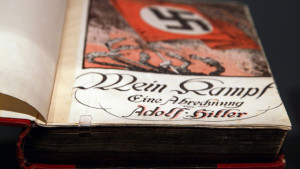
Adolf Hitler’s genocidal vision for a pure Aryan race has been resurrected in book-form for the first time in 70 years.
Hitler’s Mein Kampf is a 1925 book outlining the future German Fuhrer’s vision for a world free from global Jewish and communist conspiracies. It allowed the rising star of Germany to get a foothold in the establishment during the 1920’s by voicing his concerns and grievances against what he perceived to be threats to Germany. By the time of the great financial crash of the 1920’s originating from Wall street, the future Nazi leader was well on his way in justifying his conspiracy claims, following the devastating effects of the great depression and the war reparations imposed on Germany at the end of the first world war.

BYPASS THE CENSORS
Sign up to get unfiltered news delivered straight to your inbox.
You can unsubscribe any time. By subscribing you agree to our Terms of Use
Latest Video
For the first time since the end of World War II, authorities have allowed the publication of the historic document, which will be available in German book-stores this Friday. Mein Kampf signalled the rise of Nazism in Europe, which led to the second world war. Germany was ultimately defeated by Allied and Russian forces after the death of tens of millions of people in 1944.
The book is being printed with a number of annotations, to reveal to the right wing inclined European public of today, the dangers of skewed thinking, conspiracies and propaganda.
The Guardian reports:
The two-volume political treatise, an infamous rant written between 1924 and 1926 and which posits a global Jewish conspiracy, is regarded as one of the Nazis’ main propaganda tools. It has been re-issued as a 2,000-page annotated version after its 70-year copyright expired.
The head of the Munich Institute for Contemporary History, which published the work, said it had received orders for some 15,000 copies against a print run of just 4,000.
There had been requests for translations into Italian, French and English, and demand from Turkey, China, South Korea and Poland, Andreas Wirsching told a news conference on Friday.
The publication has unleashed fierce debate in Germany, a country still struggling with its Nazi past and its responsibility for the deaths of over six million Jews during the Holocaust. Some German Jewish community leaders have said the “antisemitic diatribe” should remain banned.
But the institute, which added some 3,500 notes to the text, defended the publication. “The edition unmasks Hitler’s false allegations, his whitewashing and outright lies,” Reuters quoted Wirsching as having said.
The book became a bestseller in Germany in the 1930s, after Hitler had become chancellor, and sold 12m copies by the time the second world war ended in 1945. It was translated into 18 languages, but after the war it was banned in Germany by the allied occupying powers.
“The book is not only a historical source, it’s a symbol,” said Christian Hartmann, co-editor of the edition. “And we wanted to dismantle that symbol once and for all.”
But opinion is divided among the Jewish community, with some leaders welcoming the new version and others questioning whether it was necessary to propagate the incendiary text again.
The president of Germany’s Jewish Council, Josef Schuster, told the broadcaster NDR that he welcomed the publication of the annotated version as it would serve to “undo the myth of this book” and show how “completely wrong and ridiculous Hitler’s theories … were”.
Charlotte Knobloch, leader of the Jewish community in Munich, however, said she could not imagine seeing Mein Kampf in shop windows.
Ronald Lauder, president of the World Jewish Congress, told Agence France-Presse that not only would “Holocaust survivors be offended by the sale of the antisemitic work in bookstores again”, but that he also failed to see a need for a critical edition.
“Unlike other works that truly deserve to be republished as annotated editions, Mein Kampf does not,” he said, arguing that academics and historians already have easy access to the text.
And even though it should be studied and German students taught about the devastating impact it had, said Lauder, “the idea that to do so requires an annotated edition with thousands of pages of text is nonsense.”
He added: “Now, it would be best to leave Mein Kampf where it belongs: the poison cabinet of history.”



